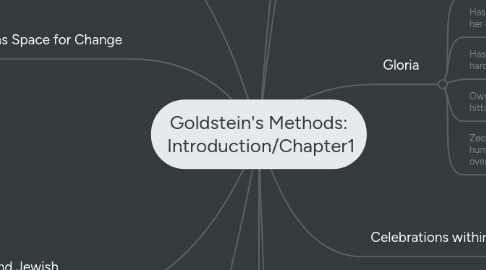
1. Childhood memories and Jewish uses of humor
1.1. Memories of loud laughter from her childhood that seemed to ease the hard lives of the Jewish immigrants
1.2. The laughter of her childhood, "masked a certain loss of innocence" and allowed an understanding of a truth of her hardship growing up
1.3. In Jewish culture, humor was a survivalist response
1.4. Humor from cruelty induced situations create a shared experience to bring people together
2. Humor within the local Brazilians
2.1. "Opened up a window onto the complicated consciousness of lives that were burdened by their place within the racial, class, gender, and sexual hierarchies that inform their social world." (p. 3/4).
2.2. To Women: "giving voice to this group of women who have little access to the public sphere" (p.4).
2.3. Expresses sentiments that are difficult to say publicly, unites the poor in a their own language,
2.4. "Humor is one of the fugitive forms of insubordination" (p.5).
2.5. A means to resist and overcome from the may movements (women's, black consciousness, AIDS social movements).
2.5.1. AID Movement linking Women's empowerment movement
2.6. Black humor
2.6.1. "bad taste"
2.6.1.1. making fun of rape or death in the family
2.6.2. New node
2.7. Historical implications
2.7.1. Their made source of income comes from exports and they never industrialized as other countries
2.7.2. The elite came together to form a republic and created a segregation of Afro-Brazilians from the elite
2.7.3. A constitution that protects its citizens is brought about but the everyday practice doesn't always match this
2.7.4. Inflation is a huge problem and is tried to get under control by Cardoso, but there are still problems that cause so much social divides between the classes to this day
3. Humor Opens Space for Change
3.1. Humor plays a role in creating boundary formation within class structures
3.2. Laughter comes as a group and can upset boundary lines
3.3. Absurdity and laughter
3.3.1. This shows an understanding of the people seeing the world as being a bit mad
3.4. Humor is a means of escaping pain and human suffering
4. Approach
4.1. Combining thickness and sense of both political economy and historical underpinnings of contemporary, ethnographically observed practice" (p.44)
4.2. participant-observer
4.3. Leans toward Gut Marxism
5. Humor explained by scholars
5.1. Humor as a kind of homeostatic mechanism
5.1.1. escape-valve
5.2. Humor as anti-rite - Douglas
5.2.1. "weapons of the weak"- James Scott
5.2.2. Laughter can be a way for the poor class to slyly show their dignity
5.3. Laughter can be powerful by putting the truths out but sometimes it doesn't live up to its potential.
5.4. Bakhtin
5.4.1. There is a circularity between the elite and how the poor mimic them
5.4.2. poor would reintroduce the body as a form of comedy by items that were considered "bad taste"
5.4.3. Carnivalesque aesthetic
6. Definitions
6.1. Favela
6.1.1. Shantytown
6.2. hegemony
6.2.1. pre-dominance of ruling-class interests and of the acceptance of those interests as commonsense by those subordinated to those interests
6.2.2. habit forming
6.2.3. Cultural hegemony - system of attitudes, beliefs, and values that supports ruling class domination.
6.3. "Taste"
6.3.1. Bourdieu says, "taste is one of the mechanisms through which inequality, difference, and privilege are structured and embedded in one's habitus, naturalizing schemes of perception" (p.36)
6.3.2. changes depending on your social status and signifies your place within the world.
6.3.3. serves as a cloak for the real agenda for power.
6.4. Primary Infomant
6.4.1. the people who inform the social scientists
6.5. Laughter Out Of Place
6.5.1. Humor developed under pressure of cruel and unusual circumstances
6.6. Gut Marxism
6.6.1. "Anthropologists and scholars who generally feel deeply about the world situation and hold tat it conforms broadly to Marx's theories of political economy and class conflict" (p.46)
7. Participant-Observer
7.1. One way to interact with the locals
7.2. Laughter was helpful by providing locals a release and commentary on their situations
7.3. Initial research led her to see that activist friends of hers where able to impact the social change more greatly by being somewhat distant
7.3.1. "The combination of class privilege and activist engagement often enables particular individuals to impact public policy in ways that North Americans are rarely able to achieve" (p.30)
7.3.2. Middle-class elite hire lower class to cook and clean, which leaves more time for them to have hobbies and actively lead within politics.
7.3.2.1. This leads to a sense they are not as grounded on what the poor may need or want as their representatives.
8. Survey Research
8.1. distanced and broad
8.2. Gathers a large amount of information
8.3. doesn't get into the emotional or personal stories associated with topic being surveyed
9. Gloria
9.1. Represented one of the poorest end of the working class
9.2. Has a house with a small attached shack for her daughter, her boyfriend and their baby.
9.3. Has to rely on help from her friends during hardtimes
9.4. Owned a rabbit ear old tv that needed some hitting to work
9.5. Zeca's death was hard to deal with but dark humor helped to keep those feelings from overwhelming the family
9.5.1. form of black humor
10. Celebrations within Brazil
10.1. Celebrations like New Year's and Carnival open up a time for all members of every class to celebrate together in the streets
10.2. The poorer class becomes more prevalent begging so blatantly
10.3. Carnival
10.3.1. Gives Brazil an opportunity to present itself to the world in a certain way
10.3.2. Everyone's experience within different classes is different within the celebration
10.3.2.1. Nothing changes for the poor as a result of this celebration
10.3.2.2. Allows some to forget their problems
10.3.3. Reinforces class, gender, sexual hierarchies
10.3.4. Pokes fun at the rich and the circumstances of the poor alike
